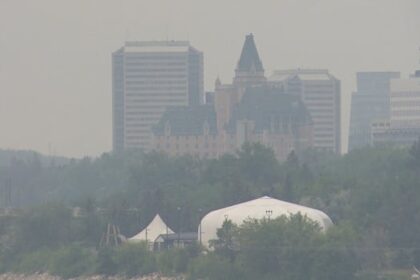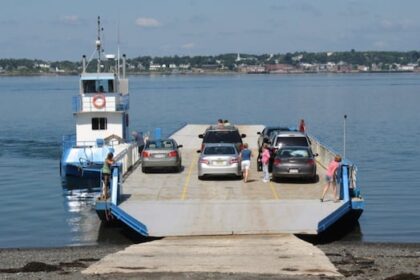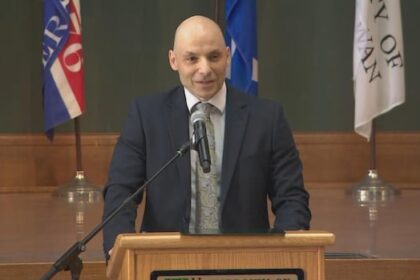New BrunswickU.S. tariffs targeting Canadian timber that came into effect Oct. 14 have prompted a Maine pulp and paper manufacturer to halt the importation of unfinished wood from New Brunswick, cutting off at least one stream of income for dozens of suppliers.Decision by Woodland Pulp cuts off revenue source for dozens of N.B. producers, says businessmanAidan Cox · CBC News · Posted: Nov 26, 2025 5:00 AM EST | Last Updated: 3 hours agoListen to this articleEstimated 5 minutesThe audio version of this article is generated by text-to-speech, a technology based on artificial intelligence.Woodland Pulp stopped buying Canadian timber in October because of the added costs resulting from a 10 per cent tariff U.S. President Donald Trump slapped on timber imports. (Submitted by Scott Beal)A 10 per cent tariff that U.S. President Donald Trump slapped on timber imports this fall has prompted at least one mill in Maine to suspend shipments from New Brunswick, sending shockwaves through parts of the province’s forestry industry.Woodland Pulp LLC halted its purchases of New Brunswick timber starting Oct. 14, in light of the new tariff on softwood and certain hardwood timber, said company spokesperson Scott Beal.”It certainly adds cost to the business and, you know, like other wood users, I mean we’re always looking and hoping and trying to source fibre at the least cost,” Beal said.Beal said the company’s purchase of wood had already been reduced in recent months due to a downturn in the global pulp market. That downturn more recently prompted the company to pause receiving wood for 60 days, in addition to a planned 26-day long suspension of operations at its Baileyville, Me., which started over the weekend.The shutdown has resulted in about 140 workers — about a third of the workforce — being laid off at Woodland Pulp, and at a neighbouring mill run by a sister company.WATCH | How newer U.S. tariffs are having knock-on effects for N.B. industry:Maine mill’s halt to buying Canadian timber shakes N.B. forestry sectorU.S. tariffs imposed in October have prompted a pulp mill in Maine to halt purchases of Canadian timber, resulting in lost revenue and fewer work for dozens of New Brunswick producers and truckers.While poor market conditions were the primary reason for suspending operations, Beal said the tariffs didn’t help, adding that up to 30 per cent of the wood the company processed until October came from New Brunswick.”Once we come up out of the [shutdown] next month, we’ll have to assess how this tariff will play into the grand scheme of things going forward. Right now, I don’t think that that’s fully understood,” Beal said.At least 50 producers affected in Sussex region aloneWoodland Pulp’s demand for timber is something Karl Von Waldow built part of his business around over the past two years.The owner of Waldow Farms said that in addition to sending his own timber across the border, he operated a wood yard near Sussex, where at least 50 producers would bring their product for him to truck across the border for them.Almost all of it was headed to Woodland Pulp.”I’ve had to change drastically what we’re doing on this side and even pivot some of my operations just because we, we don’t have the work. I mean it went from … 50 to 70 [tractor-trailer] loads per week to five,” he said.Timber, including all softwood and some hardwood, have been subject to a 10 per cent tariff when imported into the United States since Oct. 14. (Radio-Canada)Von Waldow said he directly employed a handful of people full time to transport the wood to Maine. Some of them have been laid off, while others have been redeployed in different parts of the business.He said redirecting the wood to other mills in New Brunswick isn’t an alternative option because of the low prices being offered, or quotas limiting the amount of wood the mills can receive.”For myself, there’s probably five to six jobs [affected], but if you take what that translates to, you know, the mechanics working on equipment to, you know, guys in the forestry sector that maybe is not as busy and they’re laying some people off because of it, you know, maybe it is 30 to 50 jobs [affected] in the region.”$1M in sales to Woodland Pulp in 2024Sales of timber to Woodland Pulp also served as a source of revenue for producers in western New Brunswick, said Kim Jensen, manager of the Carleton-Victoria Forest Products Marketing Board.But even before the latest tariff wiped out their demand for New Brunswick timber altogether, she said there were already signs that demand had been waning.A Maine company’s pause on buying New Brunswick wood has cut off a reliable income stream for some timber producers in the province, says Kim Jensen, general manager of the Carleton-Victoria Forest Products Marketing Board. (Submitted by Kim Jensen)She said sales of timber by the marketing board’s members alone totalled about $1 million for all of 2024, but slid to only about $200,000 over the past 12 months.Jensen estimates her marketing board only represents about a third of producers who were selling product to Woodland Pulp, meaning the dollar-figure loss for the region is likely much larger.”Almost essentially all of the hardwood that is being harvested now is just being cut for stove wood,” Jensen said.Some mills in Maine are still buying imported poplar wood, Jensen said, even though the rates they offer aren’t as attractive.With many producers paying for loans on trucks and other expensive equipment, she said their only option is to pivot, even if doing so doesn’t bring in the kind of money they’d anticipated.”There’s always low points, but this has been a really low point.”Prime Minister Mark Carney announced in August a $1.25 billion lifeline for Canada’s embattled softwood industry, to be distributed by banks but backed up by the Business Development Bank of Canada.However, it remains unknown when exactly that support will be made available.ABOUT THE AUTHORAidan Cox is a journalist for the CBC based in Fredericton. He can be contacted at aidan.cox@cbc.ca.
Shockwaves felt in N.B. forestry sector as Maine mill halts Canadian imports











